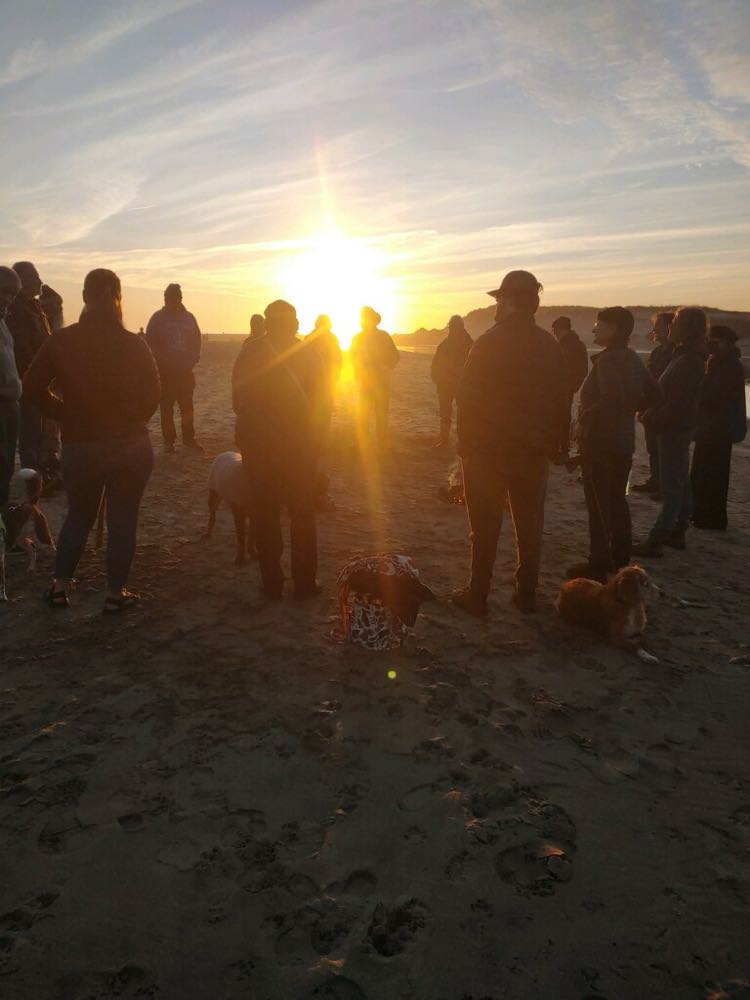
Friday November 17, 2023. Community members circle up at sunset to honor Native salmon.
We gathered around a small fire on the sand by Ecola Creek, near the spot where a whale gave her life in service to others. Our purpose was to honor homecoming salmon who also offer up their lives in the circle of creation.
Awareness of our common bond grows in these little events. Each gathering brings us a baby step closer to knowing how sacred this place is.
Participation mostly depends on weather. Sometimes three people have huddled in the wet November wind. Last year two friends graciously stepped in as hosts so Jennifer and I could be with my dying dad. Building a fire wasn’t possible at that time, due to a temporary burn ban. So local sisters marked the occasion with a prayer of gratitude shared by a descendant of the Patawatomi, whose Native group name means “those who tend the hearth-fire.”
One time two dozen folks showed up, including several visitors with Indigenous ties to this county called Clatsop, “those with pounded/dried salmon.” I’d brought a big bag of tobacco grown specifically for Native ancestors. I said how grateful I was that city leaders had decided to treat the nearby grounds of the old school and village as a gathering place for community members and respectful visitors, not just another tourist facility. Everyone present was invited to throw handfuls of leaf into the flames, offering up silent prayers if that felt appropriate. I sang a medicine gathering song from the neighboring Nehalem watershed, where my family resides in this connected “place of the people.”
At one point an old friend leaned toward me and whispered “you don’t need to use so much tobacco.” I assured him I could get more, which hasn’t proven nearly as easy as I thought. When we take gifts for granted, lessons in humility often follow.
The same Clatsop friend shared a related maxim during a recent public meeting. “Only use what you need,” he said, a familiar yet tricky bit of Indigenous wisdom for any of us to follow. Humans are famously inept at distinguishing between needs and wants. We overlook the needs of a place, and our routines become further removed from the realities of life. This erodes our common knowledge of the balance required to sustain local carrying capacity.
At this year’s fire we also honored a community member who gave close attention to the needs of nature. Jerome Arnold’s legacy lives on with the salmon, for he loved these Native creatures as both a fisherman and devoted environmentalist. As a demonstration of this resident love Jerome led hikes into the watershed to rescue stranded fingerlings that got cut off from the flow during dry weather. He’d scoop them up from isolated puddles, then carry them back to where they could survive.
Jerome’s grandson Ty shared a profound memory by the fire. Whenever they were fishing together, Ty was amazed at how quickly his grandfather would catch salmon. “They knew he was someone who cared for them,” said Ty. “So they always leapt at his line.”
Those words spoken in that space and time deepened my understanding. Jerome’s help with fingerlings served as a labor of love, providing the basic reciprocity that inspires traditional ceremonies. His work continues to have a direct impact on the salmon’s life cycle. We the people need to integrate that creative leadership into the cultural rhythms of our local watersheds. Now.
Community gatherings will help with this caregiving. Over the past two decades friends of the Ecola watershed have worked to nudge human behavior in a more resourceful direction by celebrating the salmon cycle. Jerome was a formative part of this endeavor. Hope every person who’s circled our fire will be around for many seasons to help carry the work forward.
Leave a Reply